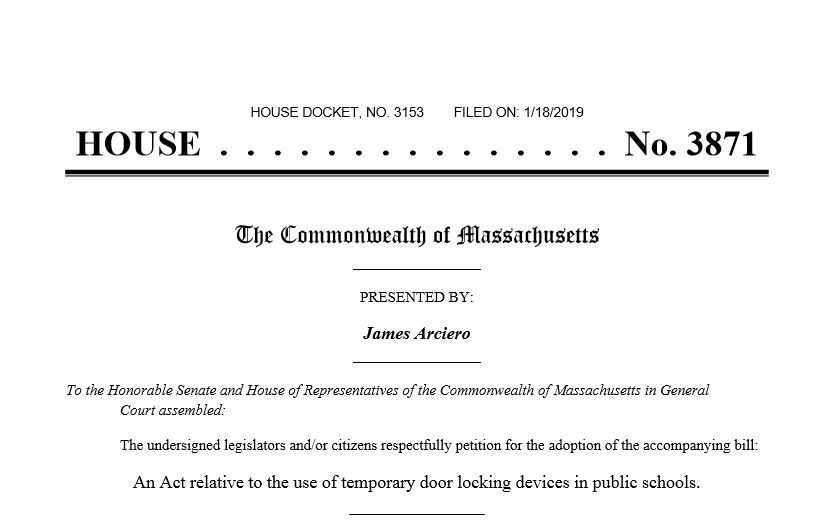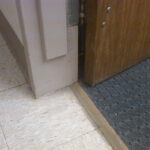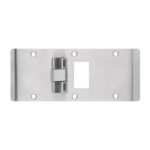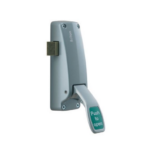 Today’s Wordless Wednesday post is not a photo of a code problem or a creative hardware modification – it is about a situation that left me very surprised, but not exactly wordless. A bill in Massachusetts – House Bill 3871, seeks to allow temporary locking devices (AKA classroom barricade devices) in Massachusetts schools, with very few restrictions.
Today’s Wordless Wednesday post is not a photo of a code problem or a creative hardware modification – it is about a situation that left me very surprised, but not exactly wordless. A bill in Massachusetts – House Bill 3871, seeks to allow temporary locking devices (AKA classroom barricade devices) in Massachusetts schools, with very few restrictions.
Why is this surprising? One year ago, I wrote about a memo that was issued by the Massachusetts State Fire Marshal and the Commissioner, Division of Professional Licensure, which included a lot of important information regarding emergency planning and preparedness in Massachusetts schools. In addition to outlining the code requirements for classroom security and other topics, the memo stated:
Specifically, the code requires all egress doors to be readily openable from the egress side with a single operation, and without the use of a key, special knowledge, or effort. The majority of retrofit classroom door security and barricade devices do not comply with this requirement and are not permitted to be installed.
Since then, Massachusetts officials have done a great job of educating school districts and others about the requirements of the adopted codes. The 9th edition of the Massachusetts State Building Code is based on the 2015 edition of the International Building Code (IBC); the Massachusetts State Fire Code is based on the 2015 edition of NFPA 1, which references the 2015 edition of NFPA 101 regarding means of egress. A document distributed by the Massachusetts Board of Building Regulations and Standards states:
Before selecting a locking method to help prevent access by an intruder, building owners need to consult with the municipal building and fire code enforcement official for the jurisdiction prior to installing any device. Permits are required to install egress door locking devices for reasons detailed herein and code officials cannot turn a blind-eye to improper installations. There have been several instances where door locks or other barriers have been installed, at great expense, in schools and other buildings by well-intentioned individuals, only to have been removed when determined to be in conflict with code provisions.
Regarding grants available for security upgrades, the Massachusetts Office of Public Safety and Security distributed another memo clarifying the classroom locking requirements:
Classroom and egress doors must comply with the provisions of Chapter 10 of the building code. These doors are critical components in the means of egress system and must be maintained in a safe manner to allow students and staff to exit the building. Specifically, the code requires all egress doors to be readily openable from the egress side with a single operation, and without the use of a key, special knowledge, or effort. The majority of retrofit classroom door security and barricade devices do not comply with this requirement and are not permitted to be installed.
Last fall, Mass held a School Active Shooter Symposium. An article about this symposium in the Journal of Emergency Medical Services describes the discussion around classroom locks and barricade devices:
Another highlight of the event was a clear explanation and presentation on the dangers of barricade devices. NFPA 3000 specifically references the door locking requirements of the 2018 NFPA 101 Life Safety Code. In school occupancies, doors must lock from the inside of the classroom, in a single motion, without having to open the door. The lock must also be accessible from outside of the room with a key, a key card, or key pad.
Jennifer Hoyt, Chief Fire Protection Engineer for the Department of Fire Services’ Division of Fire Safety, then spoke about the importance of maintaining building and fire safety while addressing new threats, and she also spoke about Massachusetts’ specific requirements. Hoyt gave examples and images of what is and isn’t compliant, and gave a phone number for schools and responders to call when they needed assistance in selecting door locks.
NFPA’s John Montes, the staff liaison responsible for NFPA 3000, pointed out that “while we understand that everyone has the very best of intentions; the use of barricade devices, wedges, or pieces of old fire hose over door mechanisms present serious life safety concerns and possible Americans with Disabilities Act violations. An assailant has not breached a locked door in any of the prior incidents, although they have shot through doors. If the occupant that placed the device is injured or impaired, how can we be sure that another occupant can remove the device to allow responders to access the space? A room full of young children cannot reach the top of a door mechanism to remove a device, or take out a wedge driven under a door. What if someone is in a wheelchair? As a public occupancy, we can’t be sure of who will end up in the space. Also, the devices may be used by assailants as a way to barricade a room from responders. Lastly, if the device is in place and you are unable to remove it because you are injured, it will significantly delay responders accessing you. Time is critical time when someone is bleeding. The safety codes exist for a reason, and there is little cost difference in investing in compliant locks versus investing in non-compliant devices, but the life safety implications can be vast.”
The position of the State of Massachusetts on classroom security is very clear – it’s one of the best examples I’ve seen across the US. BUT – a few months ago, a school district installed some barricade devices, which were ordered removed by the fire marshal (story here). I don’t know if this was the motivation for the bill, but this type of situation is what got the ball rolling in several other states.
So what happens now? A hearing was held yesterday, and several people from the door and hardware industry attended. Two fire marshals gave testimony, and other organizations and individuals submitted written positions – including the state fire marshal and NFPA. Hopefully, the Joint Committee on Education will officially decide that legislation should not be used to circumvent the adopted codes. If not, we will support the code officials and others involved in school security policy-making, to help avoid an outcome that jeopardizes the safety of students and teachers in Massachusetts.
If you are part of a company or organization in Massachusetts and would like to submit your position for consideration, get in touch with me.
You need to login or register to bookmark/favorite this content.







Lori,
I have sent you an email. Let’s get the Massachusetts AEC community behind this one.
Massachusetts 2019-H3871 shows total ignorance of the issue on the part of Mr. Archiero, Supt. Olsen and the other petitioners. I pray that cooler heads will prevail and that this measure will be dismissed due to it’s possible horrifying consequences.
No one I know has ever accused lawmakers of being intelligent, reactive yes, intelligent no!
Lori:
I sent letters to both Senators and Representatives in the House on behalf of the Partner Alliance for Safer Schools (PASS).
You published a post a few weeks back on a law suit. Do we know anything more about that?
Thanks for all you are doing to help fight the good fight.
Mark Williams, Vice Chair, Partner Alliance for Safer Schools
Thanks Mark! I tried to find more information about that lawsuit but came up empty. Here’s the original post: https://idighardware.com/2019/04/wwyd-small-town-at-war-over-active-shooter-barricades/.
– Lori
Hello,
I was at the event held at NFPA and it was an excellent explanation by Jennifer Hoyt.
It is important that these decisions be based on data, analysis and the recommendations of experts rather than emotional knee-jerk reactions.
Unfortunately, Massachusetts legislative bodies have a consistent habit of not consulting public safety experts before passing laws loaded with unintended consequences.
Thank you Lieutenant Mills – I really appreciate your insight. Unfortunately, police departments have often been strong proponents of classroom security methods that don’t comply with the life safety code requirements. Many barricade device companies use their relationships with the PD, SWAT, etc. to market their products. Do you have any suggestions about how to help law enforcement see the potential problems associated with these security devices?
– Lori